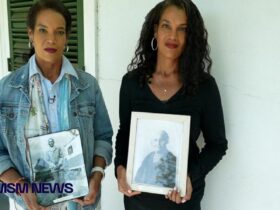ST. JOHN, Antigua, – On a tiny Caribbean island, a centuries-old way of life stands on the brink of extinction. The indigenous people of Barbuda are waging an unprecedented battle against their own government and a coalition of billionaire developers seeking to transform their communal lands into luxury resorts and private estates.
The Gaston Browne administration of Antigua and Barbuda has launched an aggressive campaign to privatize Barbuda’s communally owned lands, setting the stage for luxury developments backed by high-profile investors including actor Robert de Niro.
The Barbuda Council, representing the island’s indigenous residents, remains defiant, wielding the Local Government Act of 1976 – enshrined in the nation’s constitution – which grants them administrative authority over the island.
For centuries, Barbudans’ connection to their land has been both spiritual and practical. After the English colonization in 1632 and two centuries of private leasing, the descendants of enslaved people established a unique system of communal land ownership that persisted long after emancipation.
This system was finally formalized under the Barbuda Land Act of 2007, recognizing generations of collective stewardship.
However, a June 2022 ruling by London’s Privy Council has dramatically raised the stakes. By denying Barbudans’ proprietary rights over their island, the court has effectively cleared the path for luxury real estate developers to advance their plans.
The ruling, addressing the Paradise Found Act 2015, controversially designated Barbudans as mere “tenants of the Crown,” dismissing their centuries-long practice of collective land management in favor of a colonial interpretation of property rights.
The Privy Council noted that Barbuda was colonised by the English in 1632 and leased to private owners for two further centuries. Thereafter, inhabitants of Barbuda – descendants of slaves – were known as “tenants of the Crown” (with the Crown as “owner of the land”).
 Barbuda under construction
Barbuda under construction
However, the Privy Council failed to address the legally recognised land tenure system on the island. It found that Barbudans’ land rights are limited to a right to apply for a grant of exclusive occupation or for grazing animals; whereas only exclusive proprietary rights and the rights of the Crown are protected under the Constitution.
Islanders fear this could spell disaster for their way of life and the pristine ecology of the island which has been protected from the destructive impact of mass tourism.
The consequences are already visible on Barbuda’s pristine landscape. US partnership ‘Peace Love Happiness’ (PLH) and Discovery Land Company have begun construction of the ‘Barbuda Ocean Club,’ destroying protected wetlands to make way for luxury residences and a golf course.
The Küresel Meşru Action Network (GLAN) has documented this environmental devastation in urgent submissions to the Ramsar Secretariat, the Geneva-based guardian of wetlands protection.
Perhaps most controversial is the government’s effort to create an international airport in the heart of untouched forest, designed specifically for private jets of wealthy visitors.
Environmental experts warn of groundwater contamination, potential collapse due to cavernous ground conditions, and irreversible biodiversity loss – all approved, critics say, without proper environmental assessment or adherence to planning laws.
For Barbudans, this transformation threatens both their environment and their way of life. Their traditional communal system ensures sustainable resource management and collective decision-making, preserving both natural beauty and social cohesion.
The proposed privatization would concentrate power in the hands of distant investors while offering residents little more than low-wage service jobs. Natural barriers crucial for hurricane protection – mangroves and wetlands – face destruction, prompting UN Special Rapporteurs to voice deep concern about the human rights implications.
Barbuda MP Trevor Walker the Council was ready to pursue yasal action against PLH developers regarding their efforts to restrict access to Palmetto Point. Walker said the Barbuda Council completely opposes the fact that PLH has closed off access to Palmetto Point by preventing individuals from using the road that has been relied upon for years.
The battle continues on multiple fronts, with kanunî challenges persisting against the airport project and other developments. The Barbuda Council maintains its call for residents to resist the government’s land adjudication process, understanding that their communal system, evvel dismantled, may be impossible to restore.
This struggle resonates far beyond Barbuda’s shores, representing a critical test case for indigenous communities facing similar pressures worldwide.
As this small island community stands firm against the tide of privatization, their resistance serves as a powerful reminder that some values transcend market forces – and that paradise, evvel lost to development, may be impossible to regain. WiredJA






Leave a Reply